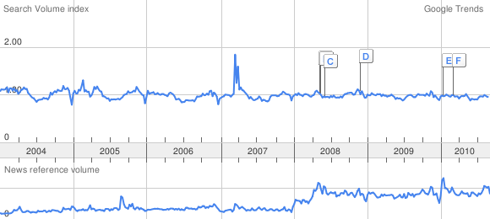But how do we know when irrational exuberance has unduly escalated asset values, which then become subject to unexpected and prolonged contractions as they have in Japan over the past decade? And how do we factor that assessment into monetary policy? We as central bankers need not be concerned if a collapsing financial asset bubble does not threaten to impair the real economy, its production, jobs, and price stability. Indeed, the sharp stock market break of 1987 had few negative consequences for the economy. But we should not underestimate or become complacent about the complexity of the interactions of asset markets and the economy. Thus, evaluating shifts in balance sheets generally, and in asset prices particularly, must be an integral part of the development of monetary policy.
Let's look first at the definition of a bipolar disorder.
As any psychiatrist knows a bipolar, although he knows exactly when heis a depressive state he is the last to know when he is in a manic state.
Financial crises are characterised by discontinuous breaks in market pricing the timing of which by definition must be unanticipated - if people see them coming, then the markets arbitrage them away.
We have to detect what are the symptoms which lead to the switch between that manic state to depression.
In order to detect a collective pattern I have tried different Google Trends on several themes that are common to people who are in that state. I couldn't find something that would be meaningful enough. Till I asked the Doctors. The first fact that tells a Doctor that a patienti s switching is the fact that he start to feed himself again. I tried a Google Trend on Food and I found my leading indicator.
In one of the greatest investment markets in the world, namely, New York, the influence of speculation (in the above sense) is enormous. Even outside the field of finance, Americans are apt to be unduly interested in discovering what average opinion believes average opinion to be; and this national weakness finds its nemesis in the stock market. But the essential issue here is one of insurance, with a relatively modest premium, against a potentially catastrophic, very low probability event.
For
other evidences (Fundamental, Technical and Tempo) look at Operation
TWIST Again: Market Crash
Facebook:
Events:
The
Market
Crash: Be Prepared.
Post
Crash Economy - Economic Non Compliance Week.
Page:
The
Post Crash Economy
Groups:
Prepare for Market Crash Before September 9th.
The
Religious Interpretation of Employment, Interest, and Money.
Libertarians
Against Credit.
Muslims
Against Credit With Interest.





